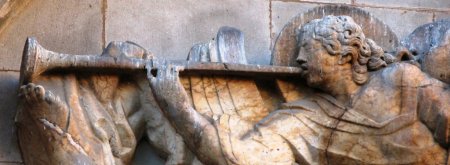Bible Scandals
One night a flasher sneaked through the grounds of Tyndale House where I work. He waited until a pretty young lady was sitting on her own at a desk facing the window and then exposed himself. He ended up humiliated. After the initial shock of seeing a face at the window, she looked at him and burst out laughing. He ran away hurriedly and she began to feel a bit sorry for him. He didn’t know that she regularly did mission work among prostitutes and often had to confront their bosses; she was used to dealing with dangerous and seedy situations.
I imagine that Jesus was equally unshockable. Unlike the rest of his respectable generation, Jesus went out of his way to meet prostitutes; they were part of the humanity he came to save. The Pharisees were scandalized that he should accept invitations to eat with “tax collectors and sinners”, but Jesus said: “It is the sick who need a physician, so I don’t seek the righteous but the sinners” (Mark 2:17). This was a clever answer, but it didn’t deal with the Pharisees’ main problem: Jesus spending his time with sinners was bad enough, but they weren’t just sinners – they were prostitutes. Prostitutes at that time were called “sinners” in polite company, just as they were called “fallen women” by the Victorians. Interestingly, the Gospels never record Jesus using a euphemism for the word prostitute, so when he condemned the Pharisees he said: “Tax collectors and prostitutes will get to the Kingdom of heaven before you” (Matthew 21:32-33).
Why is it that “tax collectors” are linked so often with these “sinners”, (ie. “prostitutes”)? And why are they usually mentioned in the context of Jesus eating with them? (see Matthew 9:10-11; 11:19; 21:31-32). The reason is that Roman-style banquets usually included prostitutes for the after-dinner entertainment – lap dancing without any restrictions. And as tax collectors were the nouveaux riches, trying to keep up with the Roman fashions, of course they provided all the customary dining 'facilities'. Perhaps the woman who broke her alabaster perfume bottle over Jesus’ feet had met him at one of these meals (Matthew 26:6-7).
Jesus wasn’t soft on sin, but he understood sinners. He pointed out that fantasizing about a person was spiritually equivalent to acting out that fantasy because both acts are deliberate and one can lead to the other. In fact he said that inner filth can be worse than visible filth (Matthew 5:27-28; Mark 7:18-23). His emphasis on motives as well as actions doesn’t mean that he downplayed the significance of sinful acts, but he wanted to point out to those who think they are righteous that they are actually sinners who need his help.
Jesus put his finger on the weak spot of the Pharisees – a common weakness which they were loath to admit. We quip that men think about sex every seven seconds and this may explain why the Pharisees were constantly concerned about preventing sexual thoughts. They went to extreme lengths such as avoiding touching their penis even while urinating [1] and trying hard not to even accidentally touch a woman. (Some said that touching a woman’s little finger was as serious as touching her genitals[2]). While walking down the street, they would stare at the ground to avoid seeing any women – some even boasted about the wounds they got from accidentally walking into walls![3] All this to avoid the temptation caused by women! But Jesus didn’t put the blame on women; he pointed out that these thoughts come from within a person, not from outside.
Jesus sounds somewhat preoccupied with sex when he called the new generation in Palestine “sinful and adulterous” (Mark 8:38) – especially as “sinful” in this context would refer to prostitutes. However, it was simply an accurate assessment of how his society had recently changed. Before the Roman army took over Judea in AD 6 there would have been few, if any, prostitutes in the very religious society of Palestine, but afterwards the presence of Roman soldiers created a demand for them. Paradoxically, this was because the soldiers were so disciplined – unlike other armies, they weren’t allowed to rape or even to get married, so they were forced to pay for sex.
Some soldiers did, in fact, find a way round these regulations by creating a novel form of marriage certificate that was disguised as a loan certificate. Several of these have been found by archaeologists and they record a 'loan' made by a soldier to a woman without any repayment terms. It was similar to a marriage certificate which records gifts to the bride, though without the marriage vows. When the soldiers retired, they could declare their 'marriage' publicly. However, this ingenious way of getting married was merely a heart-warming exception; most solders turned to prostitutes, and many poor people and former slaves fell into the profession as a result.
We can sympathise with these soldiers and prostitutes without condoning their actions. It is striking that the Old Testament doesn’t actually condemn normal prostitutes, though it utterly condemns cultic prostitutes who had sex with 'worshippers' at Temples of the old Canaanite gods (Deuteronomy 23:17; Jeremiah 2:20). Also, there is severe condemnation for those who make people into prostitutes (Leviticus 19:29) and criticism of those who use them (Genesis 38; Proverbs 23:27; 29:3). Prostitutes themselves, however, were not ostracised by society – they could own property and could even present legal cases before the highest court of the land (1 Kings 3:16-27).
The book of Proverbs regards adultery as a far worse sin than an unmarried man turning to a prostitute (Proverbs 7:5-21). It regards both as wrong, though it points out that “a prostitute only wants a loaf of bread, but an adulteress hunts you for your precious soul” (Proverbs 6:26). Interestingly, many modern Bibles consider this is too soft on prostitutes, so they translate “a prostitute leaves you with nothing but a loaf of bread…”.
Jesus was sympathetic to the individuals without being soft on the sin itself. When asked to affirm the death penalty for a woman 'caught in the act', he asked for those without sin to throw the first stone. It was only after everyone else had searched their hearts and left that he got tough with her: he told her to stop sinning (John 8:11). If she was a prostitute this meant that he was also telling her, in effect, to become unemployed with no prospect that anyone else would employ her.[4]
The Bible shows us that prostitutes can be rehabilitated, marry and even become highly respected, though they may face severe prejudice. The Law allowed a former prostitute to marry just like everyone else, though she couldn’t marry a priest. This wasn’t on moral grounds – as if prostitution was beyond the pale – because priests were also forbidden to marry divorcees and widows. The most important family tree in the Bible – that of the Messiah – contains two prostitutes: Tamar, who got pregnant while pretending to be a full-time prostitute; and Rahab (Matthew 1:3, 5; Genesis 38; Joshua 6:25). Some commentators are embarrassed by this and have tried to redefine Rahab as an 'innkeeper', but the text unambiguously calls her a 'prostitute' (Hebrew zonah).
The early church contained former sex workers and their clients, as Paul points out to the Corinthians (1 Corinthians 6:9-11), but to how many churches today could Paul say, “And this is what some of you were”? Maybe this is because most churches have done very little work among this group, though fortunately this is now changing. The organisation Stop The Traffik is a prime example – it has linked together different charities and organisations who are working in this field and campaigns against modern slavery and sex trafficking. Steve Chalke, one of its founders, has been appointed the UN Special Advisor on Community Action against Human Trafficking, which is a wonderful official recognition of the work done by churches and others in this area.
How many Christians work among the street walkers in their own church locality? Unlike Jesus, who accepted invitations to meals where prostitutes would be present, we tend to avoid any situations which might even appear salacious or compromising to our reputation. Prime Minister William Gladstone, who had a great deal to lose if his reputation was sullied, chose to ignore this danger. He set up and personally worked in charities which helped prostitutes leave that profession. Similar problems may face such workers today, but whatever reasons churches give for not helping those caught up in the sex industry, Jesus’ example shows us that we should think again.
Go to 4. Marital Abuse
References
[1] m.Nid.2.1; b.Nid.13a-b.
[2] b.Shab.1.9
[3] b.Sot.22b
[4] This story is dismissed by some historians because it is missing from many of the early gospel manuscripts. However, rather than a later generation making up the story, it is more likely that people in the early church censored it from their own copy of the Gospel to prevent women in their family thinking that adultery wasn’t serious. Although the Jews had lost the right to carry out capital punishment, stoning by a mob could still occur, and zealots were known to kill someone without trial in the Temple area, where this incident occurred (John 18.31; Acts 7:57-58; m.San.9.6). See Roger Aus, Caught in the Act, Walking on the Sea and the Release of Barabbas Revisited (Atlanta: Scholars, 1998) especially pp.1-26.
To see the full list of contents and find out more about The Jesus Scandals, visit the book's website: www.BibleScandals.com.
Buy the book from Amazon.co.uk.
© 2012 David Instone-Brewer
This article is reproduced by the kind permission of the author and may not be further reproduced without written permission.



